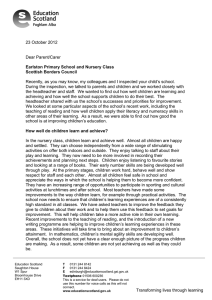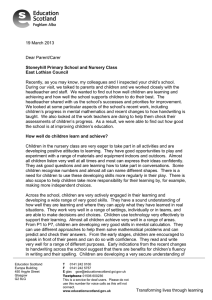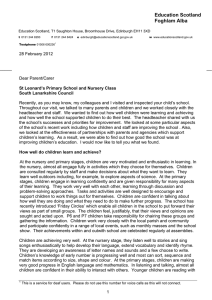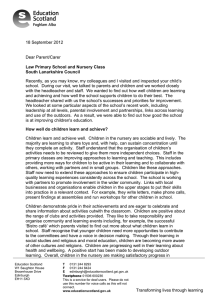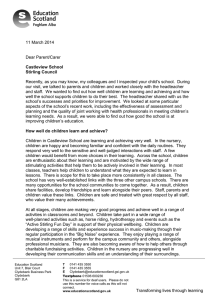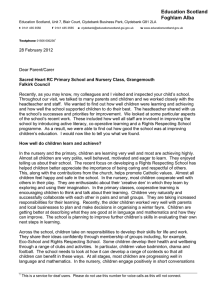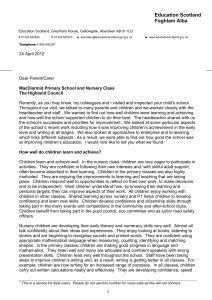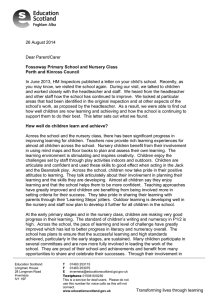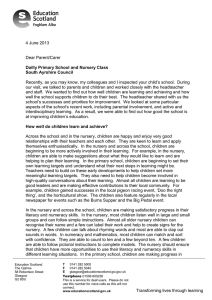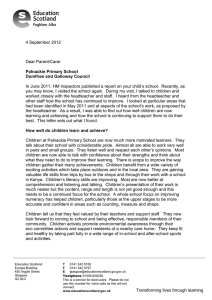Education Scotland Foghlam Alba
advertisement
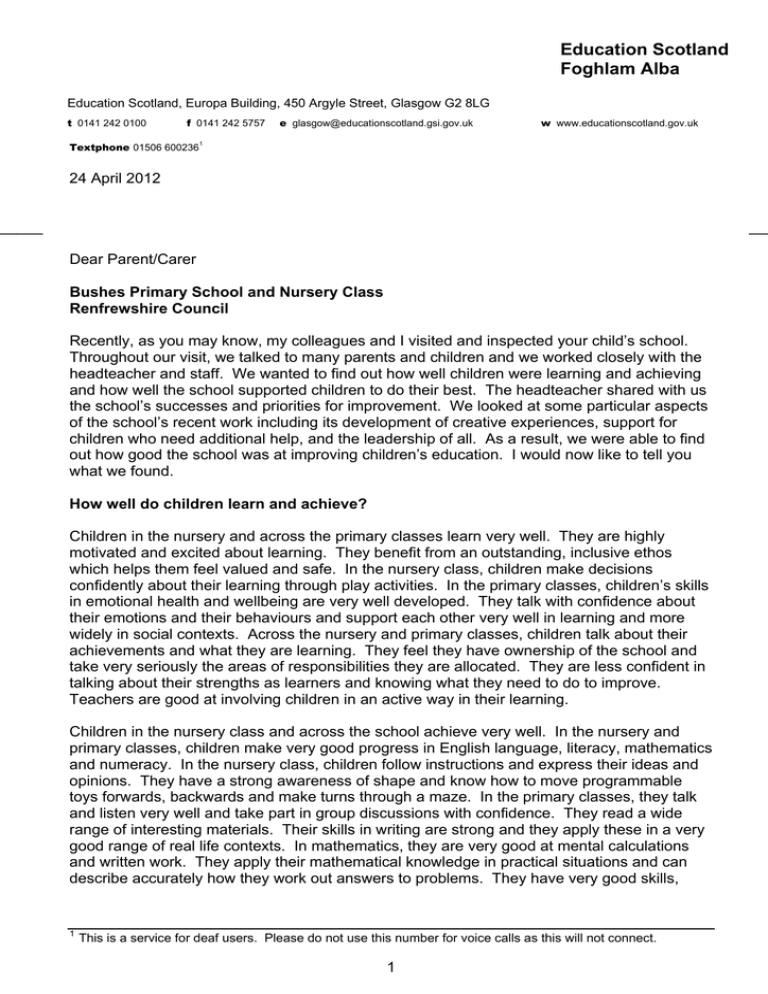
Education Scotland Foghlam Alba Education Scotland, Europa Building, 450 Argyle Street, Glasgow G2 8LG t 0141 242 0100 f 0141 242 5757 Textphone 01506 600236 e glasgow@educationscotland.gsi.gov.uk w www.educationscotland.gov.uk 1 24 April 2012 _____ ___ Dear Parent/Carer Bushes Primary School and Nursery Class Renfrewshire Council Recently, as you may know, my colleagues and I visited and inspected your child’s school. Throughout our visit, we talked to many parents and children and we worked closely with the headteacher and staff. We wanted to find out how well children were learning and achieving and how well the school supported children to do their best. The headteacher shared with us the school’s successes and priorities for improvement. We looked at some particular aspects of the school’s recent work including its development of creative experiences, support for children who need additional help, and the leadership of all. As a result, we were able to find out how good the school was at improving children’s education. I would now like to tell you what we found. How well do children learn and achieve? Children in the nursery and across the primary classes learn very well. They are highly motivated and excited about learning. They benefit from an outstanding, inclusive ethos which helps them feel valued and safe. In the nursery class, children make decisions confidently about their learning through play activities. In the primary classes, children’s skills in emotional health and wellbeing are very well developed. They talk with confidence about their emotions and their behaviours and support each other very well in learning and more widely in social contexts. Across the nursery and primary classes, children talk about their achievements and what they are learning. They feel they have ownership of the school and take very seriously the areas of responsibilities they are allocated. They are less confident in talking about their strengths as learners and knowing what they need to do to improve. Teachers are good at involving children in an active way in their learning. Children in the nursery class and across the school achieve very well. In the nursery and primary classes, children make very good progress in English language, literacy, mathematics and numeracy. In the nursery class, children follow instructions and express their ideas and opinions. They have a strong awareness of shape and know how to move programmable toys forwards, backwards and make turns through a maze. In the primary classes, they talk and listen very well and take part in group discussions with confidence. They read a wide range of interesting materials. Their skills in writing are strong and they apply these in a very good range of real life contexts. In mathematics, they are very good at mental calculations and written work. They apply their mathematical knowledge in practical situations and can describe accurately how they work out answers to problems. They have very good skills, 1 This is a service for deaf users. Please do not use this number for voice calls as this will not connect. 1 knowledge and understanding in science. Older children can discuss the differences between an ethical dilemma and an ethical issue. How well does the school support children to develop and learn? The school supports children to develop and learn very well. The curriculum is very well organised and builds on children’s learning from the nursery through to P7. The curriculum has a well-defined framework which enables staff to be creative and to respond appropriately to topical events which make learning relevant to children’s interests and needs. Staff make very good use of links across the curriculum to deepen learning and challenge children’s thinking. Relationships are very inclusive and staff know children and their family circumstances very well. In the nursery class, children benefit from stimulating activities and high-quality dialogue with staff which meets their learning needs fully. In the primary classes children also benefit from discussions of a high-quality that take place during lessons. For most children the pace of learning is appropriate and builds well on what they already know. The school uses very effective approaches to support children who need extra help with their learning, including effective planning and regular progress checks. A few children make outstanding progress in their emotional development as a result of the support they receive. How well does the school improve the quality of its work? The school improves the quality of its work very effectively by involving all staff, partner agencies, children and their parents. The headteacher is very active in making sure everyone’s opinions are heard. A very good example of this was the ‘Big Thinking Day’ which was very well attended by children, parents and staff. Staff know the school’s strengths and what needs to be improved and, together with children, they lead improvements very well. The school has a real sense of community in which everyone learns very well from each other. The headteacher is highly respected by children, staff, parents and the community. She makes a notable difference to the lives of some of the most vulnerable children. Her compelling vision for the school is clearly understood by all. She is very well supported by a skilled management team. Together with the staff they are committed to ensuring all children who leave at P7 are responsible, confident and successful in their learning. This inspection of your school and nursery class found the following key strengths. • • • • • The inclusive ethos based on very positive relationships and highly-motivated, confident and enthusiastic children. High levels of achievement in many areas of learning due to the impact of the dedicated staff team and partnerships with parents and support agencies. The school’s contribution to the local community. The positive impact of children and staff on improving the school. The headteacher’s outstanding leadership. We discussed with staff and the education authority how they might continue to improve the school and nursery class. This is what we agreed with them. • • Further improve progress in learning across all aspects of a broad general education by continuing to develop Curriculum for Excellence. Continue to develop challenge in learning and children’s understanding of how they learn, across all classes in a consistent way. 2 What happens at the end of the inspection? We are satisfied with the overall quality of provision. We are confident that the school’s self-evaluation processes are leading to improvements. As a result, we will make no further visits in connection with this inspection. The local authority will inform parents about the school’s progress as part of the authority’s arrangements for reporting to parents on the quality of its schools. Elizabeth C Cole HM Inspector Additional inspection evidence, such as details of the quality indicator evaluations, for your school can be found on the Education Scotland website at http://www.hmie.gov.uk/ViewEstablishment.aspx?id=8150&type=2. Please contact us if you want to know how to get the report in a different format, for example, in a translation. You can contact us at enquiries@educationscotland.gsi.gov.uk or write to us at BMCT, Education Scotland, Denholm House, Almondvale Business Park, Almondvale Way, Livingston EH54 6GA. If you want to give us feedback or make a complaint about our work, please contact 01506 600200, or write to us at the above address or e-mail: feedback@educationscotland.gsi.gov.uk. 3
